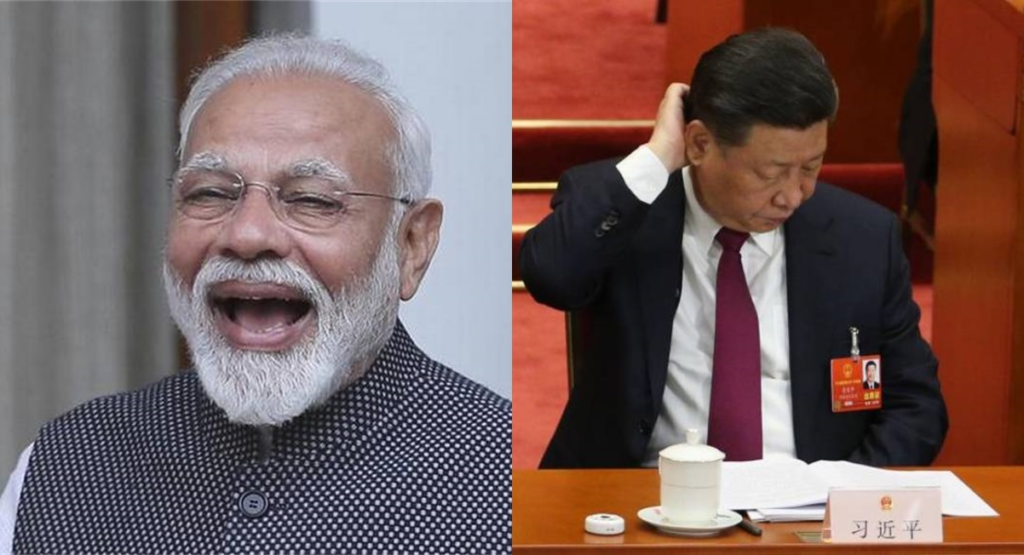As the coastal town of Mamallapuram prepares to host the informal summit between Prime Minister Narendra Modi and Chinese President Xi Jinping, scheduled in October this year, India has received a major shot in the arm as China has moved to assure India that it shall not rake up the Kashmir issue during the bilateral meeting, pouring cold water over Pakistan’s desperate attempts to find the mention of Kashmir during every such meeting.
Chinese Foreign Ministry spokesperson Hua Chunying cleared the air around the meeting by saying, “I’m not sure if Kashmir will be on the agenda because this will be an informal summit. I think we need to give the leaders time to discuss whatever they would like to. She moved to clear China’s stance on the Kashmir issue by stating: “we see Kashmir as a bilateral issue between India and Pakistan.” This statement is likely to send shockwaves within Pakistan as barring China, no other country has supported Pakistan in its quest to internationalize the issue of Kashmir. It seems that China is softening its stance vis-a-vis Kashmir because it knows very well that India has managed to turn the tables on both Pakistan and China through some deft diplomacy and political will. China perhaps was testing waters with its support to Pakistan and the subsequent attempt to coerce the UN Security Council to take a stand on Kashmir ended up embarrassing both the countries as the closed-door UNSC meeting did not result in a joint statement as the US, Russia and France rallied around India.
This changed stance on the part of China could be the result of recent events and India’s changed approach. It is customary for China to bully other countries and often enjoys a position of power at the negotiating table. However, in what was as a slap on the wrist, India’s move to reschedule the meeting between NSA Ajit Doval and China’s foreign minister Wang Yi on boundary talks, caught China off-guard and in a bid to save face, moved to ‘cancel’ the meet. It is believed that since Yi was supposed to visit New Delhi post his visit to Islamabad, the Indian government saw it as a move by China to interfere in its internal matters and hence, sought a change of dates.
China, which occupies Aksai Chin, a territory of India, has discomfort even in recognising Ladakh or Jammu and Kashmir as part of India. Therefore, The recent face-off at the Ladakh border shows that India took the first mover’s advantage. With unsettled border disputes, China and India have had standoffs at the border, especially before crucial bilateral meetings, with China being the aggressor, the belligerent trespasser. During the Doklam standoff, India gave China a befitting reply by engaging in a prolonged standoff that increased tensions between the two countries right before the Wuhan Summit where Xi Jinping and Narendra Modi had an informal meeting. This time, however, before the meeting between the two leaders, the Indian Army has been carrying out an Integrated Exercise in Eastern Ladakh sending a clear message to China that India is prepared for any misadventure on the part of China, and its expansionist moves shall be foiled by India. This is when the faceoff between Indian and Chinese soldiers near Pangong lake took place and was settled through diplomatic mechanisms. Right after this, the Northern Command Chief, Lt Gen Ranbir Singh visited Eastern Ladakh and addressed Indian soldiers there, in what asserts India’s unhinging position on Ladakh and Aksai Chin. These series of events have placed India in a greater position of power at the negotiating table ahead of the upcoming meeting, much to the disadvantage of China.
India has largely steered clear of the outrage manufactured by China and Pakistan over the Kashmir move. Now, China’s sinister intentions have been disrobed by its own actions, like taking the matter to the UN, in an attempt to internationalise Kashmir issue to the utter disadvantage of India, and with blatant disregard for India’s sovereignty. However, China failed, and left red faced, China has to deal with an India that has seen through its antics.
